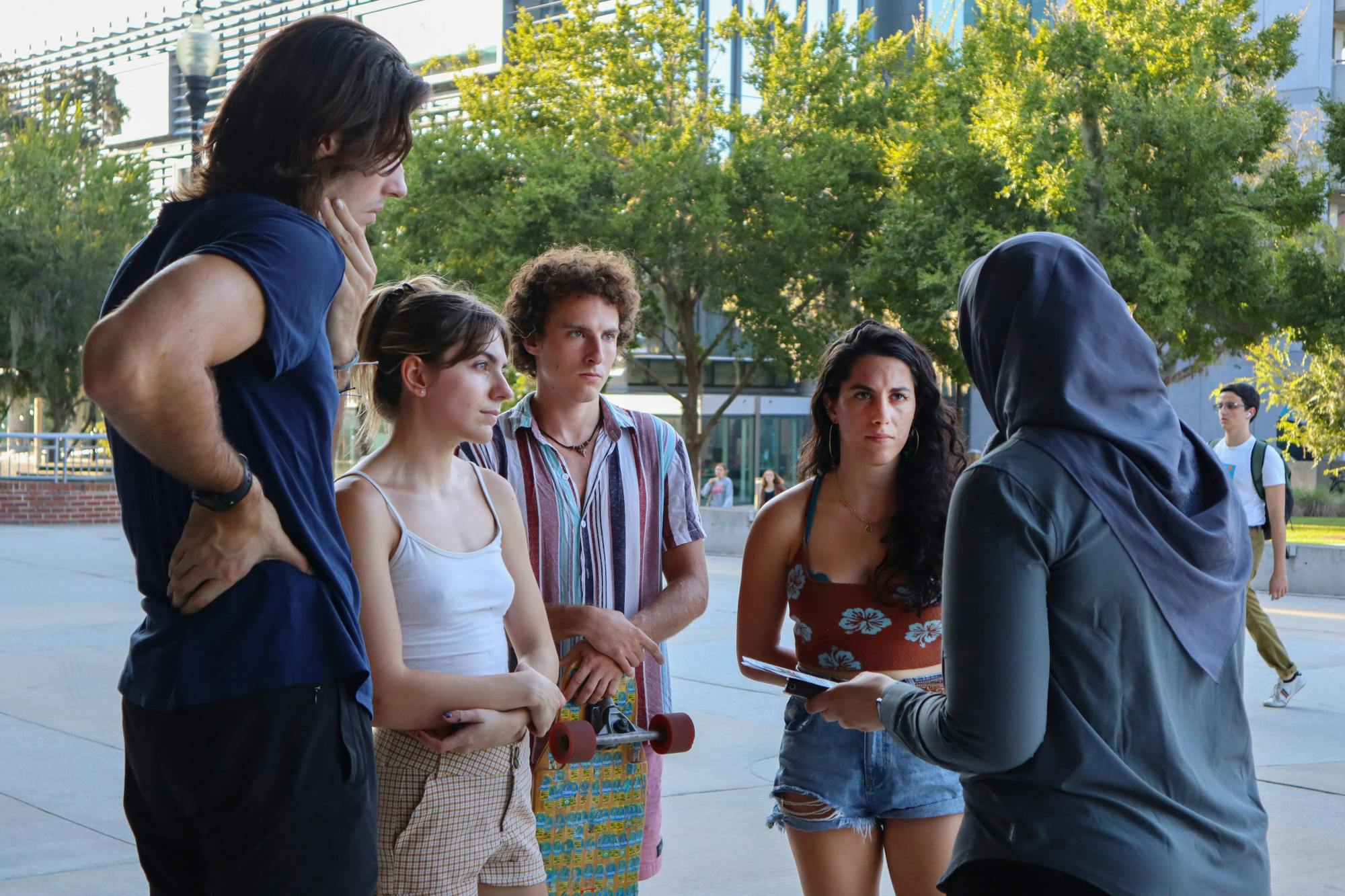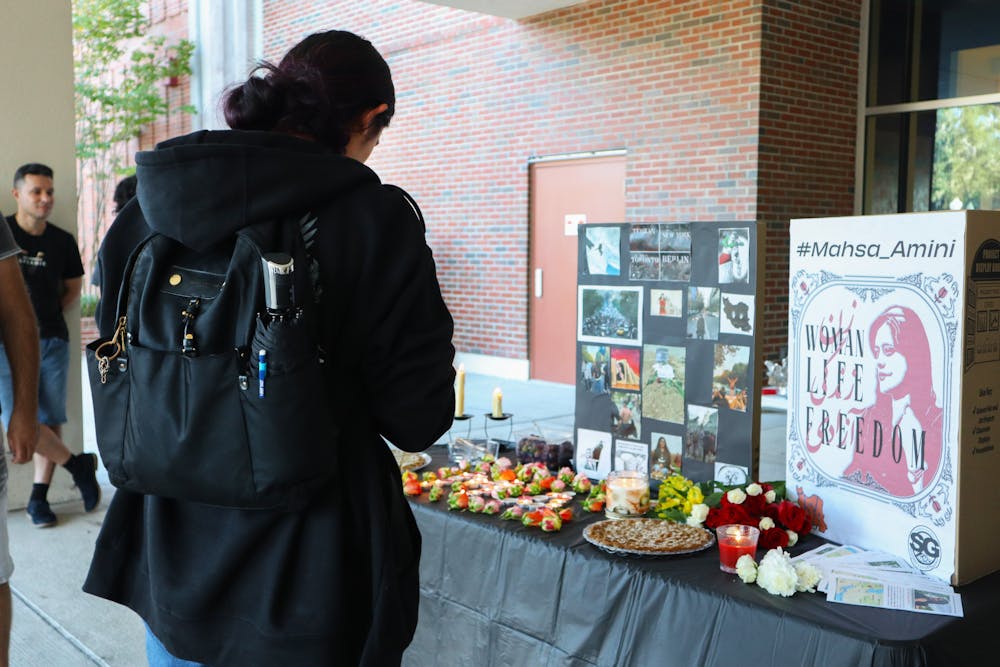Minah Nayeri was scrolling on Instagram when she found out about the brutal death of Mahsa Amini in the custody of Iranian police last Friday. For Nayeri, who grew up in Iran, this is nothing new. The way Amini was treated is commonplace.
The 25-year-old first-year graduate pharmacy student was one of a handful of Gainesville students who came together at the UF Iranian Student Association memorial service outside the Reitz Union in honor of Amini, a 22-year-old Iranian woman who died after being arrested Sept. 16 in Tehran for allegedly breaking hijab rules.
On a table laid with black cloth, UF Iranian students arranged candles to form the initials “MA” in front of boards with pictures of protests around the world and of Amini. Roses were brought by attendees and laid next to the candles.

Iranian students arranged candles, flowers and a traditional dessert called halva on a black-draped table in memory of Mahsa Amini, Thursday, Sept. 22, 2022.
Halva and dates filled with walnuts, dishes traditionally eaten when someone passes, were set out for attendees.
Amini, 22, was arrested by Iran’s “morality police” — armed officers that arrest women not following the government’s dress code — while in her brother’s car, according to London-based outlet Iran International.
She was unresponsive when she was taken from the Vozara Detention Center to a hospital in northern Tehran two hours after her arrest, where she later died.
Her father, along with eyewitnesses, assert she was beaten to death by Iranian police, according to an NPR report. Police refute that idea, instead suggesting she suffered from a heart attack. She ultimately died of brain trauma from multiple blows to the head and blood in her lungs, Iran International reported.
In response to Amini’s death, Iranians have taken to the streets of Tehran to protest, calling for an end to gender-based violence from government groups like the morality police.
Some women have also cut their hair or burned their hijabs in protest of Amini’s death.
Nayeri is busy with school and can’t physically go to Iran, so the ISA memorial was a way to show solidarity in a time of need, she said. She fears for her mother and brothers in Iran as the protests spread to more cities other than Tehran, she said.
“I’m sad I can’t be there to fight with them,” Nayeri said. “But I'm happy that this generation is willing to make a change and is willing to fix the mistakes that were made by generations before us.”
ISA began planning the memorial Saturday, said Reza Esmaeeli, a 29-year-old Ph.D. student in the chemistry department and ISA president.
“This was a clear violence of the basic rights of every human being to be free to choose their own lifestyle.” Esmaeeli said. “We are all standing by that.”
The protests in Iran have occurred alongside Iranian President Ebrahim Raisi’s visit to New York for the United Nations General Assembly.
The U.S. Treasury Department accused the Iranian police of being responsible for Amini’s death and violating the rights of peaceful protestors. The agency imposed sanctions on seven high-ranking Iranian military and security officials Thursday.
ISA distributed an educational brochure that explained terms like the “morality police.” The brochure also provided a summary of what happened to Amini and described the aftermath of Amini’s death.
“Try to spread the word, try to raise awareness,” Esmaeeli said. “I think it has a very important message for non-Iranians.”
The 1979 Islamic Revolution in Iran introduced a mandatory public dress code for all women, requiring women to wear a hijab and loose-fitting clothing.
Marium Abdulhussein, a 19-year-old UF statistics and public relations junior, said she empathizes with ongoing protests against forced hijab wear but has a lot of respect for the headwear.
“I’m someone who used to wear hijab,” Abdulhussein said. “It’s very beautiful, and it does have good ties. And I know women, some of my best friends, in hijab and [her best friends] feel empowered by it.”
Her personal issue arises when the hijab is used as a tool of oppression, Abdulhussein said.
“The reasoning is always perverted when you’re forcing these women to wear hijab,” she said.

When she found out about Amini, Niloofar Gopal Pour, a 29-year-old fourth year graduate student in chemistry and ISA treasurer, said she was working in a lab, where on one hand she continued her experiments and on the other, she scrolled on Twitter and Instagram reading the news.
Gopal Pour said she couldn’t focus on her work. All she could think about was the protests going on in her home and her whole family there, without her.
Now that internet services have been restricted in Iran, it’s important now more than ever for UF students and family to be voices for Iranian people, Gopal Pour said. The Treasury Department announced Friday a list of services that American tech firms who plan to expand and ease restrictions on Internet communications in Iran can provide.
“People are sad about everything back home,” Gopal Pour said. “This is the only place that we have to gather together and just share this sadness together.”
Contact Sophia sabolfathi@alligator.org and Anushka at adakshit@alligator.org. Follow them on Twitter @SophiaAbolfathi and @Anushkadak.

Anushka Dakshit is a fourth-year journalism and women’s studies major and the general reporter on the University desk of The Alligator. She started out as an arts and culture reporter at The Avenue and hopes to pursue arts and culture reporting and print magazine journalism in her career. Along with The Alligator, she is one of the Print Editorial Directors of Rowdy Magazine. In her free time, she likes to listen to old Bollywood music, read and obsess over other writers’ processes whenever she has no idea what she’s doing (which is often).






